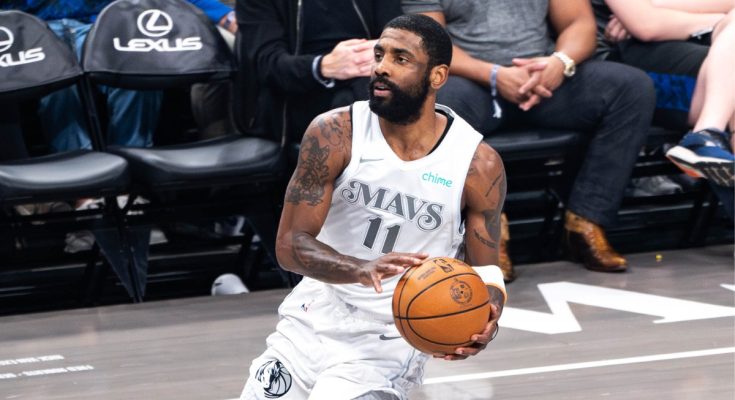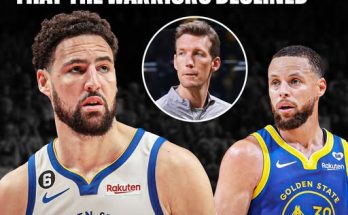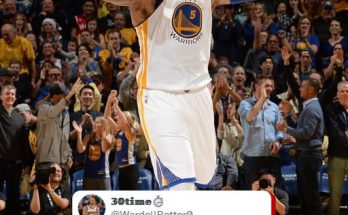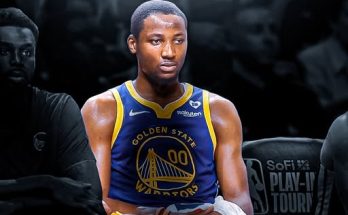When Kyrie Irving finally sat down to address the swirling narratives surrounding his relationship with Kevin Durant and their time with the Brooklyn Nets, fans braced for drama, controversy, or at the very least, subtle jabs between former teammates. Instead, what they got was maturity, reflection, and perhaps most surprising of all—clarity. Kyrie made it very clear: “There’s no beef.” A sentence that not only cooled off the speculation but also marked a significant turning point in how the NBA world views one of the most polarizing duos of recent memory. For a partnership that began with championship aspirations and ended in underwhelming results, the closure provided by Kyrie’s recent comments might be just what the story needed.
From the very beginning, the idea of Kyrie Irving and Kevin Durant teaming up in Brooklyn sparked dreams of an NBA dynasty. When both stars committed to the Nets in the summer of 2019, it felt like a seismic shift in league power. Durant, recovering from a torn Achilles suffered in the 2019 NBA Finals, brought the promise of elite scoring and championship pedigree, while Kyrie added flash, finesse, and an unshakable belief in himself. The duo was marketed as the future, not just of the Nets, but of the league. Brooklyn became the epicenter of basketball excitement almost overnight.
However, expectations and reality often diverge in professional sports, and that’s precisely what happened in Brooklyn. Durant missed the entire 2019-20 season recovering from injury, while Kyrie played only 20 games due to his own ailments. Their partnership didn’t truly begin until the 2020-21 season, which also saw the addition of James Harden, forming a superstar trio that was supposed to be unstoppable. And for brief stretches, they were. The trio played only 16 games together but boasted an astronomical offensive rating that teased the league with what could be.
Yet what could have been never truly materialized. Injuries, off-court issues, and internal conflict derailed their ambitions. The 2021 playoffs offered a glimmer of what was possible when Durant nearly defeated the eventual champion Milwaukee Bucks almost single-handedly, his foot barely touching the three-point line in Game 7’s dying moments. But even that iconic moment became symbolic of the Nets’ era—brilliant, but ultimately not enough. Kyrie’s absence due to injury during that playoff run further underlined the fragility of their title hopes.
Then came the 2021-22 season and the vaccine controversy that engulfed Kyrie. His refusal to get vaccinated against COVID-19 led to prolonged absences and a fractured team dynamic. The Nets were forced to play part-time basketball with one of their key stars missing home games. James Harden eventually asked out, frustrated by the instability, and was traded to Philadelphia. What had once been a dream team began to fall apart at the seams. Durant requested a trade during the offseason but returned after meetings with ownership. Still, the instability lingered. When both Kyrie and Durant were eventually traded in early 2023, it marked a disappointing end to what was once expected to be a golden era.
Given this backdrop, the speculation that there was animosity between Kyrie and Durant seemed inevitable. The media often paints former teammates as rivals after parting ways, especially when expectations go unmet. But Kyrie’s recent statements were not just surprising—they were illuminating. He described his relationship with Durant as “real,” highlighting the personal growth they both experienced during their time together. He emphasized that they remain in communication and that their respect for each other transcends basketball. For Kyrie, the Brooklyn chapter was not just a failure—it was a learning experience.
What stands out is the sense of personal accountability Kyrie conveyed. He acknowledged that things didn’t work out as planned but refused to blame others. He admitted that external noise, personal decisions, and timing all played roles in the Nets’ collapse. Instead of finger-pointing, Kyrie leaned into introspection, explaining that he has learned the value of alignment—not just on the court but in vision, culture, and communication. This kind of insight suggests growth, a shift from the often-defensive stance he’s been known to take.
Durant, for his part, has echoed similar sentiments in previous interviews. While not as openly reflective as Kyrie, Durant has never publicly criticized his former teammate and has often downplayed any suggestion of tension. The mutual respect remains intact, perhaps even strengthened by the trials they endured together. Both have moved on—Kyrie to Dallas and Durant to Phoenix—but the lessons of Brooklyn seem to have left lasting impressions on each.
The Nets era for Kyrie and KD will always be one of the NBA’s great “what if” stories. On paper, it had everything—talent, star power, a supportive front office, and a rabid fan base hungry for a title. In practice, it suffered from a lack of cohesion, unpredictable absences, and a series of unfortunate circumstances. For fans, the era may be remembered with frustration, but for the players, it may serve as one of the most important chapters in their careers—one filled with hard lessons rather than hardware.
Now in Dallas, Kyrie is working alongside Luka Dončić, trying to help shape another young superstar’s championship path. He’s spoken highly of his time in Brooklyn but has made it clear that he’s focused on the future. The Mavericks offer a new stage, a new system, and new challenges. Yet his reflections on Brooklyn prove that Kyrie isn’t simply moving on—he’s evolving. Durant, meanwhile, is trying to guide the Phoenix Suns to a title, working with Devin Booker and Bradley Beal in another iteration of a superteam. While the ghosts of Brooklyn may linger, they don’t seem to haunt either star.
That may be the ultimate takeaway. In sports, failure is often seen as the opposite of success, but in reality, it can be a prerequisite. Kyrie and Durant’s failed title pursuit in Brooklyn may not have yielded rings, but it clearly helped shape their perspectives and, perhaps, their maturity. The lack of beef, as Kyrie says, is more than just a refusal to feud—it’s an understanding that the game is bigger than one team or one chapter.
There’s something refreshing in Kyrie’s transparency. In a league where grudges are often worn like badges and rivalries dominate headlines, seeing a superstar take the high road is a rare sight. The narrative could have easily become toxic, divisive, and endless. Instead, Kyrie has chosen peace, reflection, and wisdom. He’s let the fans and critics know that while the Brooklyn dream didn’t materialize, it wasn’t a nightmare—it was a meaningful, albeit turbulent, part of his journey.
Whether fans accept that or continue to long for what might have been is another matter. The story of Kyrie and KD in Brooklyn is now written, and while it lacks the Hollywood ending many expected, it ends not with conflict, but with clarity. And maybe that’s more valuable than another headline-grabbing feud. Maybe that’s what real growth looks like in today’s NBA.



